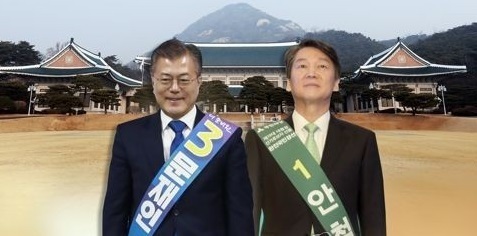Security is emerging as a key issue for South Korea's upcoming presidential election as two liberal front-runners are vying to woo swing voters jittery over Pyongyang's escalating military threats, observers said Tuesday.
With the election race seen shaping up to be a duel between Moon Jae-in of the liberal Democratic Party and Ahn Cheol-soo of the center-left People's Party, their differences on how to rein in the provocative state have gained renewed voter attention.
Moon has been inclined more toward dialogue with the wayward regime, while Ahn has favored a more "balanced" approach -- a delicate mixture of sanctions and diplomacy that analysts said has stricken a chord with some moderate conservatives.

In past elections, right-wing presidential hopefuls utilized security as their forte, but they have not fared well this time with the political pendulum having swung in favor of the liberal bloc following the recent ouster of scandal-hit former President Park Geun-hye.
"North Korea has been seen preparing for a sixth nuke test, and this highlights the heavy gravity of the security issue in the lead-up to the election," said Chang Yong-seok, a senior researcher at the Institute for Peace and Unification Studies at Seoul National University.
"In fact, the nuclear and missile issues are still a crucial variable at the moment that creates the conservative-liberal divide, and against this backdrop, we are facing a key election to pick our next leader," he added.
From a high-thrust rocket engine test to ballistic missile launches, Pyongyang's recent provocative acts have ratcheted up cross-border tensions, bringing home to voters the urgency of its evolving military threats.
The latest deployment of strategic US military assets, such as the nuclear-powered Carl Vinson aircraft carrier, to the peninsula has further underlined the daunting security challenge Pyongyang poses not only to Seoul but also to Washington.
Undecided conservative voters have been carefully watching the liberal candidates' remarks for glimpses into what approaches they would take to handle the North if elected president in the May 9 vote.
Moon's campaign remarks have apparently unnerved them. Moon has expressed his desire to "visit Pyongyang first" before Washington and resume the suspended inter-Korean industrial complex in the North's border city of Kaesong, a crucial source of hard currency for the cash-strapped regime.
In particular, his call to defer the ongoing installation of a Terminal High Altitude Area Defense system, a core element of the US' global missile defense shield, on the peninsula has further agitated security-conscious voters, political watchers said.
However, Ahn's relatively flexible stance on security has been more appealing to right-wingers, analysts noted. He said he would "respect" the Seoul-Washington agreement over THAAD and voiced reservations about the immediate resumption of the Kaesong complex.
"Conservatives regard security as part of their core, basic values -- a reason why they have responded sensitively to security and North Korea issues," said Park Won-gon, a political science professor at Handong Global University.
"Overall, those on the right side of the political spectrum appear to have some sense of anxiety over Moon's security stance, while they lean more towards Ahn -- albeit not with any firm conviction or support for him either," he added.
Still, questions linger over Ahn's position on security as many raise the possibility that his influential party chief, Park Jie-won, could reorient Ahn's policy on the North. Park was a chief aide to former President Kim Dae-jung, whom critics denounced for his unconditional largess to the North.
Ahn's stance straddling the ideological fault lines has appeared helpful in boosting his support ratings, observers noted.
In the latest survey conducted last week by local pollster Realmeter, Ahn garnered 37.2 percent, up 18.5 percentage points from a week earlier, while Moon scored 42.6 percent, up 7.7 percentage points.
Hong Joon-pyo of the conservative Liberty Korea Party came in a distant third at 8.4 percent.
With the gap between Moon and Ahn quickly shrinking, observers predicted that any major provocation by the North, such as another nuclear test, could tip the political scale in Ahn's favor
"If Pyongyang undertakes another strategic provocation, this would put Moon at a disadvantage, while Ahn may be able to stand his ground and fare well. ... Of course, conservative presidential aspirants, such as Hong, will also benefit from the situation," Chang said.
Mindful of his potential disadvantage, Moon has recently sharpened his rhetoric against the North.
During a visit to an Air Force base last week, the longtime front-runner has warned the North that it would cross the "bridge of no return" should it carry out another nuclear test. (Yonhap)










![[Hello India] Hyundai Motor vows to boost 'clean mobility' in India](http://res.heraldm.com/phpwas/restmb_idxmake.php?idx=644&simg=/content/image/2024/04/25/20240425050672_0.jpg&u=)








